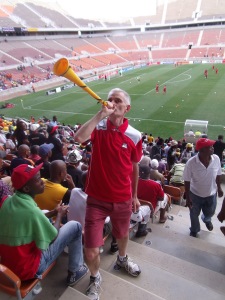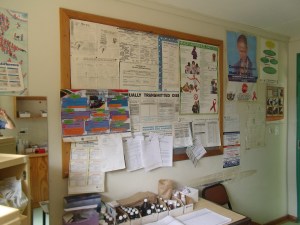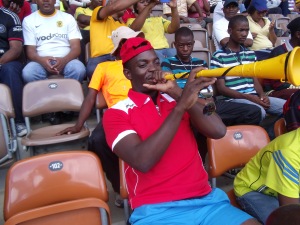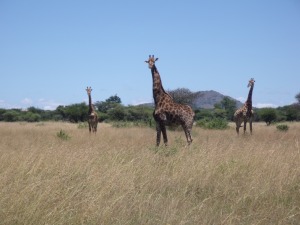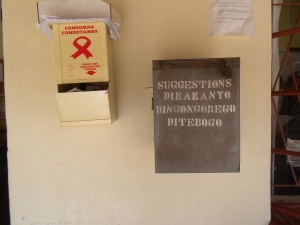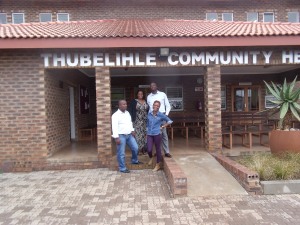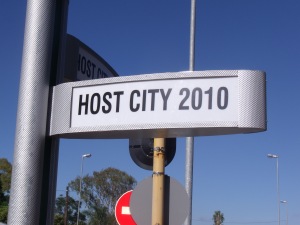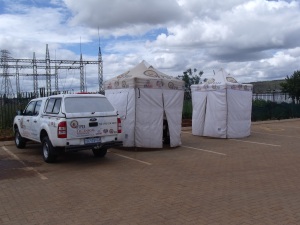Archive for February 2014
Big wins
Stay with this blog football dislikers as there’s plenty for everyone. But on a Saturday afternoon in mid-February what else would you expect me to do other than support my local football team? Local to me right now is Polokwane City, recently promoted to South Africa’s Premiership.
I bumped into the Peter Mokaba Stadium on an early morning walk, towering over parkland not far from my two-week residence, Rustic Rest Guesthouse. In 2010 it hosted Algeria 0 Slovenia 1 in England’s Group C and three other group matches.
According to Wikipedia Peter Mokaba was a hero of the anti-apartheid struggle and a deputy minister in Nelson Mandela’s government. His entry additionally reveals much about South Africa’s awkward history of HIV denialism:
Mokaba was HIV positive, but refused treatment because he viewed pharmaceutical drugs as poisonous; he died in 2002 of AIDS-related pneumonia. According to Mokaba, anti-Aids (sic) drugs had no benefits “beyond profits for the pharmaceutical industry”; the fight against these companies, he said, should be waged with the same intensity as the struggle against apartheid. Privately, he assured supporters that the HIV virus and Aids (sic) were part of an “international Western plot” to decimate blacks and “regain colonial control” in Africa.
A local rumour shared with me is that his political enemies set him up with women known to be HIV positive.
Out in Capricorn’s clinics, my host and area manager Pepe set an ambitious but fruitful programme: fifteen primary health clinics in four days ahead of an office Friday, which allowed for a focus group. The FPD bakkie has crawled past donkeys, cows and goats – what else in Capricorn? – blocking thoroughfares and vibrated bum numbingly over 200km of sun-baked gravel roads in Blouberg, its blue mountains an impressive backdrop. We stopped at a shockingly basic village water supply where driver, prevention mentor and football buddy Chris suggested a photo having asked permission first.
In Lepelle Nkumpi staff bemoaned their old, barely fit for purpose clinic buildings that were in contrast with some of the newly built facilities I visited elsewhere. The operational manager in one had persuaded his community to follow democratic processes for improvement rather than burn down the municipality offices. The latter approach has been deployed elsewhere in the country in recent weeks and widely reported in media coverage of public anger at the ANC government’s failure to improve infrastructure and public services.
Returning to the beautiful game, Saturday’s match against the superstars of Orlando Pirates was crackingly entertaining. Tickets had to be purchased in advance at Checkers – think Asda – a palaver since the store was off-line on my first visit. For a top flight match, R40 (£2.18) is an undoubted bargain – that’s Asda prices – Eastbourne Borough in tier six of English football costs £12.00. Chris collected me an hour before kick-off for the short drive to the stadium.
It was more Notting Hill Carnival on Wembley Way than Priory Lane, Eastbourne: orange (City) contrasted with red and black (Pirates); African dancing, singing, swaying, vuvuzelas playing; the fever pitch of a joyous be-costumed football crowd… with one white face in it. Apartheid may have fallen but the white population of Polokwane is not drawn to its magnificent stadium on a perfect Saturday afternoon for football. As if to emphasise the challenge of increasing social mobility across races that remains for South Africa, the only other white people that I saw in the stadium were the managers of the two clubs… Not that the English game is in any position to blow its own vuvuzela with only two black managers in charge at the 92 top clubs.
Thrillingly the entertainment on the pitch matched that in the stands. Despite their big name pedigree Pirates were outplayed by the home side with your blogger out of his seat on more than one occasion: for Sicho Jembule’s twenty-seventh minute goal, two should’ve-been-scored one-on-ones, an overhead effort that went close and a couple of centimetre-wide free kicks as third from bottom City deservedly won one-nil. To avoid accusations of one-eyed reportage, Pirates fluffed a couple of good chances before the Polokwane winner.
Observing the racial divide at work, the public sector primary health clinics are staffed by and serve an almost exclusively black population. The only exception so far was in Sub-district Six of Pretoria/Tshwane, whose community includes a poorer white population and a single interview (out of forty-three) with a white nurse. It is South Africa’s black population that is disproportionately living in poverty and reliant upon government services.
The progress in HIV care that is driven by the highly motivated Professional Nurses in primary health clinics that I’ve been interviewing could equally have me leaping from my seat in appreciation. Reversing the HIV/AIDS denialism espoused by Peter Mokaba and some of his contemporaries, I’ve been told by several nurses that their progress under mentoring is winning the confidence of their communities. HIV testing is widely accepted; local people with HIV who once attended distant hospital clinics or who entrusted their care to traditional healers are increasingly happy to be receiving antiretroviral therapy in their local primary health clinics. That’s another big win for the local teams.
With the stands of the Peter Mokaba Stadium visible above its acacia trees, Polokwane Game Reserve was my Sunday destination. A hot 21km hike on the White Rhino Trail included sightings of eland, steenbok, waterbuck, red hartebeest, nyala, a sable antelope a warthog, several ostrich and, saving the best till last, four giraffe in my final kilometre. Big game Saturday and Sunday. Impressive results at work and play.
Nkangala to Capricorn
Glossary
Bakkie [noun: pick-up (US) / ute (Aus)]
Challenge [noun: applied universally in South Africa to any problem / deficiency / etc. faced by FPD or health service staff.]
FPD [abbreviation: Foundation for Professional Development, my employer]
Roving mentorship team [noun: a collective comprising doctor, nurse, data capturer and health information mentor (HISM) providing technical support to a sub-district’s primary health clinics.]
The Nkangala adventure finished up at the evocatively named Watervaalboven (‘Above the Waterfall’) Clinic. Fortunately Dr Tema drove us in a four-wheel-drive bakkie beyond coalfields, through agricultural megacorporation Alzu’s boundless agricultural fields and up into the hills of Mpumalanga: a two hour journey, the final thirty minutes on gravel roads in sluicing rain that had taken its cue from the Elands Falls at our destination. I know that Britain is flooded so I’m not even beginning to grumble but I was relieved not to be in my little Ford Figo.
In that last paragraph lies one of the challenges facing FPD’s roving mentorship teams. Outside metropolitan areas such as Tshwane, the clinics are far flung. Teams can spend four hours a day on the road, halving the time available for actual mentoring in the primary health clinics that they partner. On top of this there are many clinics in each sub-district, spreading the roving team thinly. In remote South Africa patients are affected too: a local nurse remarked to me that they can spend R100 on the round trip to their ‘local’ clinic 50-70km away.
Our visit to Watervaalboven revealed another recurrent challenge. When we arrived the clinic was in disarray without a person in charge, the professional nurses all absent and a long line of patients waiting for the relief nurse to arrive from Middelburg, more than 100km away where she’d abandoned her plans. Tema could do little other than roll up his sleeves and deliver primary health care, with no NIMART nurses for him to mentor or for me to interview. At one o’clock, according to institutionalised practice our assisting enrolled nurse disappeared for a long lunch leaving patients to wait for sputum pots that we were unable to locate for TB screening, X-ray forms, etc.

The other side of the coin for NIMART mentees – the clinic Professional Nurses – is that there are multiple demands on the roving mentorship teams. In the three weeks that I’ve spent in the field I’ve witnessed mentors drawn away from their schedules for In Depth Reviews – several days helping to audit clinics’ performance against national standards – Stocktaking – two days presenting plans for the year – Action Research – a whole day polishing research proposals such as promoting MMC (Medical Male Circumcision), increasing cervical screening in women with HIV, testing babies at age eighteen months, etc. It’s not hard to imagine the frustration of clinic nurses who book their challenging cases to review with their mentors, ask patients to repeat their long, expensive journeys (see above) – there may be loss of pay on top – only to find that the agreed schedule is postponed.
All these counter demands on the mentoring teams are important. Without audit, how will South Africa know whether or not national standards are maintained? Auditing in partnership with the Department of Health demonstrates that service improvement is the goal of both parties and secures joint working. Without agreeing their plans roving teams risk “running around like headless chickens” which was one senior interviewee’s assessment of their early operation. With seventeen initiates dying in the mountains of post-operative complications following traditional circumcisions in Mpumalanga last year, promoting MMC is imperative; and when another interviewee – a clinic sister – expressed amazement that asymptomatic women with HIV had abnormal cervical smear results this is another intervention that will save lives: waiting for symptoms will often be too late for successful treatment.
Beyond my work, South African President Jacob Zuma has announced that the general election will be in early May. Despite widespread disillusion in the comment pages of national newspapers he seems certain to lead the African National Congress into his second term. Rows about corruption, high unemployment, poor public service delivery, may surround them but the ANC know that there is no opponent with a hope of winning.
Anticipation of the Proteas v Australia three-test cricket series that starts on Wednesday is intense. With Valentine’s Day marking the first anniversary of Reeva Steencamp’s death there is OJ Simpson-like attention on the Blade Runner: The Oscar Pistorius Trial: A Carte Blanche Channel will broadcast twenty-four hour coverage of the Olympian’s murder trial.

I’ve carried out 70-80 interviews, visiting thirty primary health clinics with names that are sometimes bizarre – ‘Nobody Clinic’* – other times prosaic – ‘Extension 6’, ‘Zone 2’, etc. – and often evocatively South African – see the photos. I’m staying in Polokwane’s Rustic Rest Guesthouse, just around the corner from Peter Mokaba Stadium, a World Cup 2010 stadium that I discovered on a six a.m. power walk. Next visit: Saturday afternoon, Polokwane City v Orlando Pirates when the congregations of crowned plover that flock to the surrounding grassy areas in the quiet of first light may not be so evident. It’ll be hot for football in Capricorn, this district is named for the Tropic of that passes right through it – which is something that I did today.
Yours in the Tropics.
* The Operational Manager at Nobody Clinic told me that once, the road simply ended there. Travellers would come to a halt saying “Nobody here”.
Industry without art is brutality
Industry without art is brutality
Ruskin’s quotation is blutacked to the computer in Eastbourne Sexual Health Clinic’s room 11 , the HIV clinical room, a weak play on ‘ART’ (antiretroviral therapy) and a reminder that there is an art in effective healthcare.
Week two raced past with visits to eleven primary health clinics and to Kalafong Hospital’s Immunology (HIV) Clinic in Tshwane (Pretoria). I wrote about the numbers last blog – they are similarly immense wherever I go. Now I’m swimming in numbers too: an alphabet soup of data entry with three dozen semi-structured interviews and a focus group already conducted.

On Saturday David drove the short distance from Pretoria to Johannesburg, through the gleaming skyscrapers of South Africa’s financial hub to the Apartheid Museum. Like the Holocaust Museum in Washington DC it’s a testing visit. The tour begins with an arbitrary separation: me through the entrance for ‘BLANKES / WHITES’ David through ‘NIE-BLANKES / NON-WHITES’. We walked through separate corridors of pedantically absurd yet sinister former-public signs that once separated people in every daily activity imaginable, along lines of race. SA’s sign industry was brutal. The tour articulately documents long-established pre-apartheid racism and maltreatment of black and other non-white people before walking visitors through the apartheid years, allowing its rulers’ and administrators’ extraordinary prejudice to speak for itself.
Witnessing the bravery and sacrifice of those who opposed the regime made my eighties ‘activism’ in the UK seem token: buying Free Nelson Mandela, angrily boycotting (Paul Simon’s) Graceland and marching in protest outside South Africa House pale beside the suffering of those who stood up to apartheid and the shocking exhibition of cruelty and violence they suffered that are commemorated here. I was fascinated to see familiar images from recent history and relieved to exit with a feeling of optimism provoked by the final displays, which led to the dismantling of apartheid and free elections. As we drove back through the central business district and Sandton on the N1 David provoked a difficult reflection: what would I do in the face of extremity..? I wonder, how brave would I be?
On Sunday I picked up a white Ford Figo for my first drive, 100km east to Witbank. The Protea Hotel Highveld’s lobby is orange and brown with explosions of white heat in Dan Myburg’s atmospheric art photographs of local heavy industry. Driving around the area, there are deep black gouges of open cast mines blasted into the landscape, mountains of slag, cooling towers and chimneys discharging steam and smoke from power stations, pot holes the size of the Great Rift Valley caused by the ceaseless round trips of heavy, articulated transporters that clog the roads as they lumberingly move the coal from mine to furnace. I’ve yet to see the vervet monkeys or meerkats that ran in abundance across the wilder roads of Eastern Cape. There’s industry but – unless you’re Myburg – little art here.
After a productive day in the clinics of Witbank, its surrounding townships and nearby small towns, today was spent in Middelburg ‘Home of Stainless Steel’ and the Steve Tshwete / Emakhazeni sub-district. In fact the landscape was far more agricultural. The challenges for people living with HIV include miners negotiating time to collect antiretrovirals and remote farmworkers even reaching clinics. After seeing a patient who’s HIV is stable and well-controlled after three years’ successful treatment being issued only thirty days’ pills I discussed issuing longer prescriptions with today’s roving team: if one hundred patients like him attend clinic every month, they’ll need 1200 appointments a-year; shifting to six-monthly follow-up would release 1000 of those seemingly needless appointments, relieve some of the burden on clinic sisters by reducing clinic queues and solve some of the patients’ barriers to attendance and retention in HIV care. If mineworkers cannot collect their ART there’ll be no industry.
There may be no sign of wild mammals but as we drove past Mpumalanga fields the cows were followed by gleaming white ‘tick birds’ (cattle egrets) and I’ve seen guinea fowl & two long-tailed widowbirds barely more airborne than the Wright brothers’ Flyer at Kitty Hawk thanks to the weight of their extended tail feathers.
In other incidental news, I bumped into an old friend from 2011, Manwick Banda, a Malawian waiter at The Willows opposite the FPD offices. I’m back in the gym thanks to Protea Highveld’s deal with Planet Fitness. South Africa being a society of extremes, from Jo-burg’s millionaires to the poor in in formal settlements and no matter how industrious my workout, I wonder if I’ll ever join the elite that are inadvertently targeted on Tshwane municipality’s website:
Mission
To enhance the quality of life of 911 people in the City of Tshwane by promoting and
Protecting the health and wellbeing of our people through leadership and best practice
In rendering accessible, affordable, sustainable, equitable quality, efficient and effective
Services in a manner that builds partnership.
Population served: year estimates 2007) based on the 2001 census figures.(My italics) Surely a typo for all that escaped the proof-reader?
To work soon and another day witnessing the enormous strides being taken to provide ART to millions in South Africa. My evaluation may reveal the art behind such industry.

